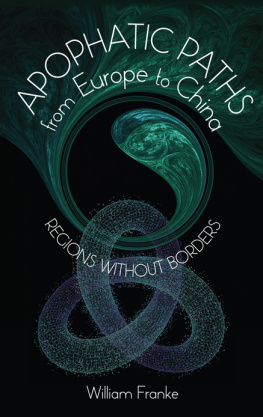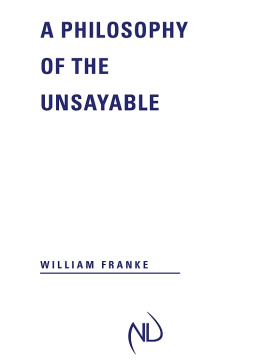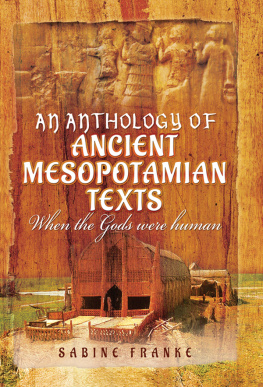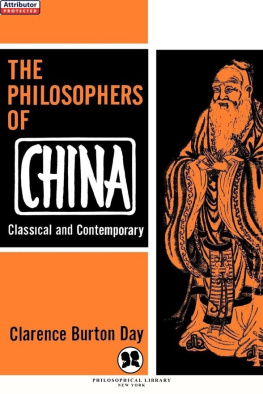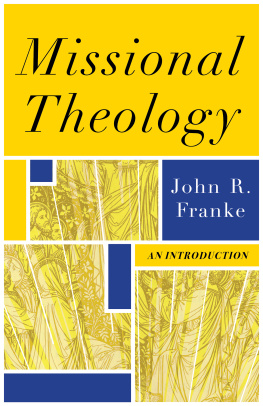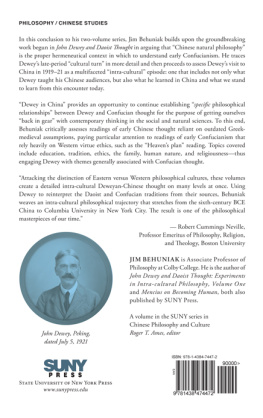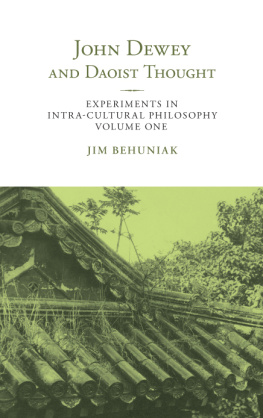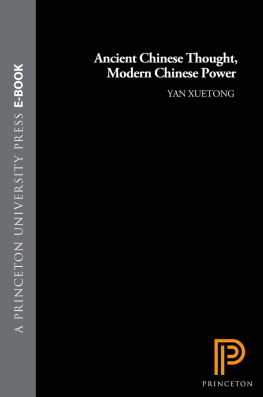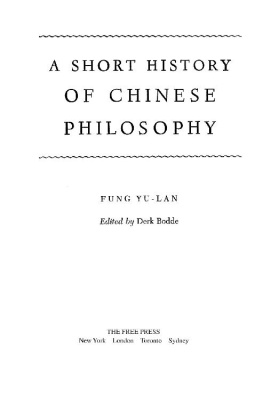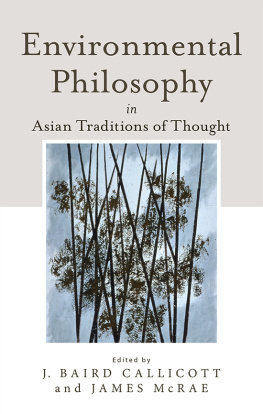PRAISE FOR
APOPHATIC PATHS FROM EUROPE TO CHINA
Up to now Franois Julliens conception of Chinese thought has not had a full representation in English. This book responds to that gap and opens a dialogue with other traditions of apophasis.
Haun Saussy, author of Great Walls of
Discourse and Other Adventures in Cultural China
By highlighting Western phenomena that are comparable to the Chinese, mainly in the apophatic tradition, Franke succeeds in exposing the biases and blind spots in Julliens as well as in Halls and Amess respective treatment of Chinese philosophy. This book will stand as an important resource for the future of scholarly debates in these areas.
Karl-Heinz Pohl, editor of Chinese Thought in a Global Context:
A Dialogue Between Chinese and Western Philosophical Approaches
APOPHATIC PATHS
from Europe to China
SUNY series in Chinese Philosophy and Culture
Roger T. Ames, editor
APOPHATIC PATHS
from Europe to China
REGIONS WITHOUT BORDERS
William Franke
Published by State University of New York Press, Albany
2018 State University of New York
All rights reserved
Printed in the United States of America
No part of this book may be used or reproduced in any manner whatsoever without written permission. No part of this book may be stored in a retrieval system or transmitted in any form or by any means including electronic, electrostatic, magnetic tape, mechanical, photocopying, recording, or otherwise without the prior permission in writing of the publisher.
For information, contact State University of New York Press, Albany, NY
www.sunypress.edu
Production, Jenn Bennett
Marketing, Kate R. Seburyamo
Library of Congress Cataloging-in-Publication Data
Names: Franke, William, author
Title: Apophatic paths from Europe to China : regions without borders
Description: Albany : State University of New York Press, [2018] | Series: SUNY series in Chinese philosophy and culture | Includes bibliographical references and index.
Identifiers: ISBN 9781438468570 (hardcover : alk. paper) | ISBN 9781438468594 (ebook)
Further information is available at the Library of Congress.
10 9 8 7 6 5 4 3 2 1
To Li Jiu Ping (Lemon)
and Wang Hai Juan (Daisy)
Leap into the boundless and make it your own.
Zhuangzi
Ultimate speech is to be rid of speech; ultimate action is to be rid of action.
Zhuangzi
CONTENTS
ILLUSTRATIONS
PREFACE AND ARGUMENT
This book is part of a larger project of rethinking philosophy and culture across historical ages and geographical continents through apophatic lenses or, in other words, through the perspective of negation, of what does not appear, of what is not and cannot be said. The apophatic thinking pursued here undertakes this task through bringing about its own metamorphosis into a programmatically intercultural philosophy. This entails attempting to think ideas not just within the bounds of a given cultural frame, with its inevitable background assumptions, but rather in unbounded ways in relation to other cultures and their different conceptual frameworks. Such thinking aims to negate, if not to neutralize, first ones own and finally any cultural framework. The possibility of relativizing culture per se by playing one culture off against the otherof stepping back and gaining critical perspective with respect to any and all cultural preconditioning, and then perchance of facing something absolute that is fleetingly glimpsed in the interstices between culturesis the momentous breakthrough of intercultural philosophy. By negating all that is culturally relative, such philosophy opens into a dimension of the absolute that can perhaps be best interpreted as theological, or at least as religious, in nature. This dimension has been the source of representations of divinity throughout the history of religions and in mythologies the world over.
This uncircumscribable, unfathomable dimension intrinsic to experience as such is the real bugbear, making culture such a volatile, conflictual, aporetic, and unmasterable challenge for philosophical thinking, as well as for the multiculturalmodern or modernizingsocieties that in our time are seen to be mushrooming all across the planet. Reflecting on culture philosophically is not just a matter of comparing different forms and variants of manifest phenomena. More fundamentally, it entails sounding out the ungraspable ground of all cultural expressions, whether this abyss is imagined as residing in human nature and its inalienable freedom exceeding the confines of any possible definition of identity; or in language, with its differential structure opening to infinity; or in a divine endowment and destiny that transcend human knowing.
We are creatures of culture even before we are self-consciously aware as subjects or agents. And centrally at stake in the philosophy of culture, most conspicuously since the Enlightenment, is the question of universality. The title in hand will eventually be subsumed under a broader rubric: The Universality of What Is Not: The Apophatic Turn in Critical Thinking. The present volume is issued as a first installment, complete and coherent in itself, of that more comprehensive project. The broader project works from the insights of negative theology as it emerges in Western civilization from antiquity, especially in Neoplatonism, and develops in medieval and baroque mysticisms, continuing all the way to modern and postmodern expressions in philosophy, religion, literature, and the arts. The work being presented now carries the self-critical vocation of such negative (or, literally, apophatic) thought into unconfined regions beyond what is recognized as the West through encounter with Eastern, particularly Chinese, traditions and their characteristic modes of thought.
Crucial to this books agenda, accordingly, is the endeavor to discern and renew the claim of universality as rethought and reconfigured within the predicament of philosophy today considered specifically as a cultural or, more exactly, an inter cultural predicament. Nothing could be more classically philosophical than the quest for universal knowledge and for a universal or common ethical and political practice. But how are we to think of universality in our times, after the concussions of postmodern thought and culture and in the midst of our current historical crisis, with its pervasive fragmentation and sectarianism? A conviction concerning the preeminent, perhaps paradoxical value of theologyspecifically in its infinitely self-critical form as negative theologyas a guide to this rethinking animates my previous works in this vein, particularly my books On What Cannot Be Said (2007) and A Philosophy of the Unsayable (2014). The special focus of the present volume is on the intercultural aspects and underpinnings of such an apophatic philosophy. In order to illuminate this focus from below and by a more particularized light than that of purportedly pure, universal reason, it will be useful and appropriate to begin in an autobiographical mode with a retrospective reflection placing the authors personal path from Europe to China in its geographical and historical context.
HISTORICAL-AUTOBIOGRAPHICAL INTRODUCTION
I write from within China, or more exactly from Macao, a Special Administrative Region (SAR) of the Peoples Republic of China. This special status is legislated to last for a limited time onlyuntil 2049for exactly fifty years starting from the 1999 handover of Macao to China by the Portuguese colonial government. This scenario is roughly synchronized with the similar handover of Hong Kong to China by Great Britain in 1997. But particularly Macao today has become the theatre of a great experiment being conducted by the Peoples Republic of China in an attempt to test the viability of opening its territory to Western-style intellectual freedom and unrestricted cultural exchange, while still maintaining an authoritarian form of government centered in Beijing. If this kind of controlled freedom can be fostered in Macao without creating a climate of revolt against the central Chinese government, maybe the model can be extended to other areas in the interior of the mainland. Something like this, we may surmise, might lie behind the reasoning of the regime in Beijing. There is much at stake for the future of China and, consequently, of the world in seeking to find ways of forging a viable form of compatibility between such overtly divergent types of civilization. The university, too, has an important role to play in this refashioning.

